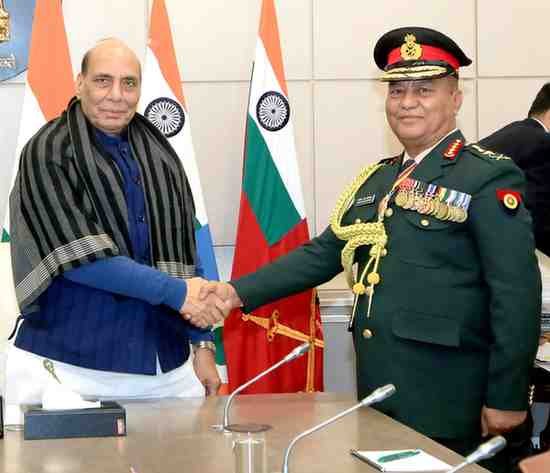Introduction:
General Ashok Raj Sigdel, the Chief of Army Staff of the Nepal Army, recently concluded his landmark visit to India. The visit holds immense significance in the context of India-Nepal bilateral relations, particularly in defense cooperation and strategic collaboration. The meeting aimed to foster stronger ties, discuss mutual security challenges and enhance the partnership between the two neighboring countries.
The Visit’s Key Highlights:
- Military Honors and Ceremonial Welcome
General Sigdel was accorded a ceremonial Guard of Honor at South Block, New Delhi. This gesture reflected India’s recognition of Nepal as a trusted defense partner and its respect for the Nepal Army’s contributions to regional stability.
- Meetings with Indian Counterparts
General Sigdel held extensive discussions with India’s Chief of Defense Staff, General Anil Chauhan, and Chief of Army Staff, General Manoj Pande. Key topics of discussion included joint military exercises, counter-terrorism strategies, and capacity-building initiatives.
- Strengthening Military Cooperation
Nepal Army officers frequently attend training programs in premier Indian defense institutions such as the Indian Military Academy (IMA) and National Defence College (NDC). Discussions during the visit focused on expanding these training programs to cover emerging areas like cyber warfare and disaster management. Joint military exercises like Surya Kiran were discussed to enhance interoperability between the two armies.
- Disaster Response Collaboration
Considering the shared vulnerability to natural disasters like earthquakes and floods, both sides agreed to strengthen cooperation in humanitarian assistance and disaster response (HADR) operations.
- Technology and Equipment Exchange
India offered Nepal advanced defense equipment and technology, strengthening Nepal’s capabilities to tackle security challenges, particularly in its border regions.
- Geopolitical and Strategic Discussions
The visit also involved discussions on maintaining peace and stability in the Himalayan region, countering transnational threats, and safeguarding critical infrastructure against emerging challenges.
Benefits for Both Nations
- Enhanced Security Cooperation
The visit has bolstered mutual trust and understanding, paving the way for seamless cooperation in addressing cross-border security threats and insurgency challenges.
- Economic and Developmental Boost
Strengthened defense ties indirectly contribute to economic stability. A secure border and stable region attract investments and facilitate trade, benefiting both countries.
- Cultural and Historical Ties
The deep-rooted cultural ties between India and Nepal were further emphasized, highlighting their shared heritage and mutual respect.
- Regional Stability
Enhanced cooperation between the two nations will contribute to peace and stability in South Asia, deterring external influences that may disrupt regional harmony.
The Role of MTDC
As the President of the Management & Technical Development Council (MTDC), I am proud to highlight our organization’s contribution to this evolving partnership:
- Strategic Advisory Support
MTDC, recognized as a parallel advisory body, has provided critical inputs to enhance India-Nepal defense cooperation. By engaging with defense experts, MTDC has emphasized joint strategic planning and execution.
- Capacity Building Initiatives
MTDC has facilitated numerous training programs for Indian and Nepalese security personnel, focusing on intelligence gathering, counter-terrorism, and disaster management strategies.
- Cultural and Historical Tiesz
As a knowledge partner, MTDC has worked closely with both governments to foster better communication, ensuring timely and effective decision-making.
- Promoting Regional Cooperation
MTDC’s outreach programs have highlighted the importance of India’s leadership role in ensuring regional stability and have advocated for Nepal’s strategic importance as a neutral, peace-promoting neighbor.
- Strengthening People-to-People Ties
MTDC has also worked to highlight the cultural and historical bonds between India and Nepal, which form the foundation of the bilateral relationship.
Conclusion:
General Ashok Raj Sigdel’s visit to India has set a strong foundation for future collaboration, ensuring a safer and more prosperous region. This visit not only enhanced defense ties but also reinforced the shared vision of peace and progress for both nations.
MTDC remains committed to supporting initiatives that bring India and Nepal closer together, leveraging its expertise in defense strategy, training, and regional development.








